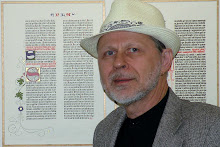13 January 2009
So, I figured out what was wrong with my 3rd person omniscient voice. I've been head-hopping. It's like this: "Brad thought Ellen was cute. Ellen thought Brad was a nerd." In two sentences, I jumped from Brad's head to Ellen's head. Do that very often and people start getting confused about whose head they are in. Recommendation is to stay with one POV per chapter or scene. That makes sense, but also means I need to pay more attention to who is the main character at any given time and stay focused.
I've noticed that in some of the books I've been reading there is a principal POV but that it changes when you need to get a bit of info that is out of the MC's range of knowledge. I remember that in Accidental Witness, everything was from the MC's POV except a chapter at the Dunes and a substory that involved the Rep's Chief of Staff and her lover. In both of those instances, the MC was not in the scene at all, so there was no question about it being his POV. Thats probably a good form to follow.
So that covers 1st person and 3rd person limited, but what about 3rd person omniscent? To really do that, you have to not go inside anyone's head. You have to be an objective outside party that doesn't write anything they can't observe. So, instead of
Omniscience objectivies everything. We don't get to see inside. We use more names, more observations. Maybe even more sentences. It would be very hard to write something that maintained a high interest level, suspense, and drama. It does, however, read more like a television show. You don't get to hear the character's thoughts. You can only see them as actors and describe what you see.
I've noticed that in some of the books I've been reading there is a principal POV but that it changes when you need to get a bit of info that is out of the MC's range of knowledge. I remember that in Accidental Witness, everything was from the MC's POV except a chapter at the Dunes and a substory that involved the Rep's Chief of Staff and her lover. In both of those instances, the MC was not in the scene at all, so there was no question about it being his POV. Thats probably a good form to follow.
So that covers 1st person and 3rd person limited, but what about 3rd person omniscent? To really do that, you have to not go inside anyone's head. You have to be an objective outside party that doesn't write anything they can't observe. So, instead of
"Steve hesitated a moment as he thought about all the dhildless mothers in the world, then, dismissing the thought, raised the gun and fired."you would have:
"Steve hesitated. It was as if some inner consience had called him to abandon his mission. If so, the conscience lost the struggle. With a slight shudder, Steve raised the gun and fired."
Omniscience objectivies everything. We don't get to see inside. We use more names, more observations. Maybe even more sentences. It would be very hard to write something that maintained a high interest level, suspense, and drama. It does, however, read more like a television show. You don't get to hear the character's thoughts. You can only see them as actors and describe what you see.
Subscribe to:
Post Comments (Atom)

0 comments:
Post a Comment